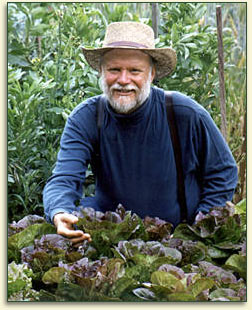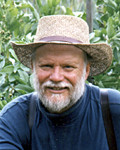John Jeavons has been working for 42 years researching and promoting backyard food production. He is the author of the best-selling book “How to Grow More Vegetables, Fruits, Nuts, Berries, Grains, and Other Crops Than You Ever Thought Possible On Less Land Than You Can Imagine” which has over 550,000 copies in print in seven languages. He has authored or helped create over 30 publications to enable people in all regions of the world to grow a balanced diet on a small plot of land. Jeavons’ food-raising methods are being used in 141 countries and by such organizations as UNICEF, Save the Children, and the Peace Corps. Jeavons’ is the Executive Director of the non-profit research organization Ecology Action, and founder of the non-profit heirloom seed and tool company Bountiful Gardens.
Jeavons mini-farming techniques often called “GROW 
– 67% to 88% less water
– 50% to 100% less fertilizer
– 99% less energy than commercial agriculture, while using a fraction of the resources.
Homegrown Food On Every Table is the catalyzing statement for the organization founded by Marjory Wildcraft. “Growing your own groceries and backyard food production is the answer to many of the major issues we are facing today” say Wildcraft. “Here in the US, malnutrition is just one of the many elephants in the room no one is talking about”.
To raise awareness, Wildcraft is conducting a series of interviews with leaders in the movement towards individual and family food self-reliance. “John Jeavons has had the biggest impact of any man alive on helping people to grow their own food” says Wildcraft.
“Hundreds of thousands of people are able to eat dinner tonight because of Jeavons work.” says Wildcraft. “I have am honored and delighted to be able to interview John first for this series”.
During the interview Wildcraft and Jeavons discuss;
– How many humans the earth has resources to feed, and a specific date for when the carrying capacity will be exceeded.
– How the Bio-Intensive method is superior for growing soil.
– Why aquaponics is not a good solution for food production.
– Recommendations for home gardeners dealing with Fukashima radioactive fallout, geo-engineering toxins, and pollution from industry.
– Best locations for surviving collapse scenarios.
Marjory Wildcraft is an Expedition Leader and Bioneer Blogger with The [Grow] Network, which is an online community that recognizes the wisdom of “homegrown food on every table.” Marjory has been featured as an expert on sustainable living by National Geographic, she is a speaker at Mother Earth News fairs, and is a returning guest on Coast to Coast AM. She is an author of several books, but is best known for her “Grow Your Own Groceries” video series, which is used by more than 300,000 homesteaders, survivalists, universities, and missionary organizations around the world.








COMMENTS(25)
Marjory, I don’t always have time to listen to every podcast from every resource or expert. I love both you and Mr. Jeavons (I use his book and your stuff religiously) – but I wasn’t sure I was going to take the time to listen … until I saw your statement:
“Why aquaponics is not a good solution for food production.”
One of the things I love about you, Marjory, is your humility. When you think you are less than a total expert on some issue, you are the first to declare such. And then you usually go on to demonstrate that you actually know a great deal about that subject. John needs to take a page from your playbook. If you don’t know the difference between hydroponics and aquaponics – just say so. Don’t wing it! He did no one any service or favors; especially himself and the credibility he has on so many other topics.
I don’t recall either you or John mentioning “Permaculture”, but for the most part you are both practitioners of this philosophy. One of the main tenets of Permaculture is “Diversity”. And as long as John is talking about vegetables – he advocates diversity. I remember him telling of the aboriginal tribe that grew 40 different varieties of rice every year. I also remember him talking about the ideal resilient community size being about 40. Why? DIVERSITY. Diversity is NOT limited to your vegetable garden!
And yet – for the most part – he shied away from any kind of animal husbandry; and completely shunned the concept of fish (or other aquatic creatures) being a viable – perhaps even a critical component to a successful ecosystem AND DIET. He acquiesced on your feelings toward rabbits – I think out of respect for you. (FYI – I agree: Rabbits rule.) But he seems to have great difficulty accepting any form of food that requires more than a 1:1 conversion of calories (i.e. meat). If this is John’s only metric – he needs to remove human being from his master plan. There are dozens of cultures (some ancient, some modern) that have established complete, self-sustained ecosystems based on the concepts of Aquaponics (mostly Asian). Aquaponics is nothing new. The symbiotic relationship between fish, plants, insects, sun & water is as old as Mother Earth herself.
By all accounts, our oceans are dying. Most of our streams and lakes are polluted so badly that the fatty tissues of all aquatic life is laden with toxic heavy metals. What we haven’t poisoned with acid rain – we are currently poisoning with phosphate run-off – both fresh water and salt water. John is hell-bent on slowing down the deforestation process; how about setting up a few aquaponic systems that may very likely represent the only hope for aquatic life over the next half century.
Yes John, lets start growing soil. But let’s not ignore the aquatic lifeforms, or the roles they play in our diet and our ecosystems.
Hi Maddog,
I appreciate you comments. I see the bio-intesive method as being an excellent component of a system. Component being the key word….
There was a lot in the interview, and also a lot we didn’t get to.
Thanks so much for writing in.
There absolutely WAS a lot … and IS a whole lot more. I did not mean to detract from the other 95% of great stuff John does and shares. However, it is my nature NOT to compliment the obvious, but rather to challenge the obscure. I commend you both; and encourage no one to dismiss Aquaponics (at least not without further research).
One of the things I find amazing about Aquaponics is that the fish need NOT consume grains or other produce potentially targeted for human consumption. In nature, most fish do not eat corn, or soy, or rice; they eat small critters: mostly bugs, earthworms, meal worms, even protein-rich maggots. Marjory, I know that you are a huge fan of eating bugs (and I too have tried my share) – but I don’t think most of this country (or even the world) is ready for bugs to become a staple. (I wonder where the USDA will put them on their food-pyramid? :o)
However, bugs ARE incredibly efficient at converting calories to protein. Caloric sources that a human CANNOT consume – like manure, animal carcasses, and other decaying matter. And fish (because they too are cold-blooded) are incredibly efficient at converting bugs to tasty and healthy Protein, Omega-3’s, and dozens of other nutrients difficult to obtain from a vegan-diet. Not to mention a convenient and readily absorbed source of Nitrogen, essential to all plant life.
I truly look forward to your upcoming projects in Aquaponics.
Sincere thanks to both you and John — Maddog
What a lovely man and a most enjoyable conversation. Thank you both.
There isn’t anything to listen to here anymore. Ack!
HI Melissa, I will get this fixed right away!
Thanks for getting on this so quickly!
We try Melissa! LOL. There is still so much to do.
How do I listen to the interview? I cant seem to find a link to it?
Please add the audio link back. Thanks.
How do I listen to the interview?
Would love to listen to the interview, however it isn’t working.
Is this interview still available for listening?
I see I’m not the only one who can’t find a way to access the interview.
There is no link to the interview 🙁
Can’t find a link to this interview.
I dont see a link. John Jeavons was one of my heroes who inspired me to learn to grow my own food back in 1996 when I started a CSA that helped me stay home while raising my children even as a single mom. I would love to access this link if it is still available.
Please post a link so we can listen to the interview. I have read it all 20 times, but no link to actually hear the interview and start the certification course.
How do I listen to the interview? I cant seem to find a link to it? Would love to listen to the interview. =)
Where is the link to the interview? Anybody bothers to answer?!
I cant find the link either? 🙁
Why isn’t there a link to connect to program? Am I missing something?
no link??
I also can’t find the link
Looking for the link as well 🙁